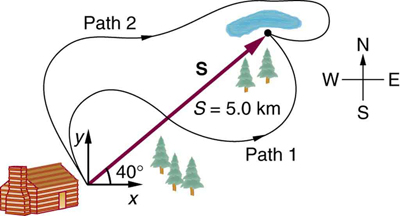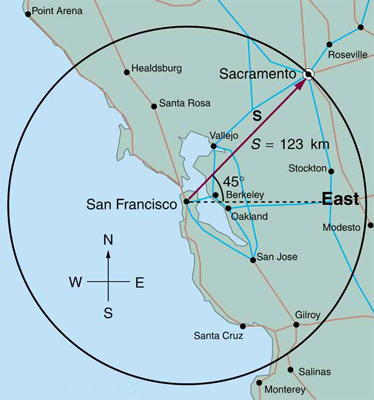| << Chapter < Page | Chapter >> Page > |
| Height (m) | Time (sec) |
|---|---|
| 0.490 | 0.1 |
| 0.882 | 0.2 |
| 1.176 | 0.3 |
| 1.372 | 0.4 |
| 1.470 | 0.5 |
| 1.470 | 0.6 |
| 1.372 | 0.7 |
A ball is launched at an angle of 60 degrees above the horizontal, and the vertical position of the ball is recorded at various points in time in the table shown, assuming the ball was at a height of 0 at time t = 0.
The graph of the ball's vertical velocity over time should begin at 4.90 m/s during the time interval 0 - 0.1 sec (there should be a data point at t = 0.05 sec, v = 4.90 m/s). It should then have a slope of -9.8 m/s 2 , crossing through v = 0 at t = 0.55 sec and ending at v = -0.98 m/s at t = 0.65 sec.
The graph of the ball's horizontal velocity would be a constant positive value, a flat horizontal line at some positive velocity from t = 0 until t = 0.7 sec.
Which of the following is a vector: a person's height, the altitude on Mt. Everest, the age of the Earth, the boiling point of water, the cost of this book, the Earth's population, the acceleration of gravity?
Give a specific example of a vector, stating its magnitude, units, and direction.
What do vectors and scalars have in common? How do they differ?
Two campers in a national park hike from their cabin to the same spot on a lake, each taking a different path, as illustrated below. The total distance traveled along Path 1 is 7.5 km, and that along Path 2 is 8.2 km. What is the final displacement of each camper?

If an airplane pilot is told to fly 123 km in a straight line to get from San Francisco to Sacramento, explain why he could end up anywhere on the circle shown in [link] . What other information would he need to get to Sacramento?

Suppose you take two steps and (that is, two nonzero displacements). Under what circumstances can you end up at your starting point? More generally, under what circumstances can two nonzero vectors add to give zero? Is the maximum distance you can end up from the starting point the sum of the lengths of the two steps?

Notification Switch
Would you like to follow the 'Sample chapters: openstax college physics for ap® courses' conversation and receive update notifications?